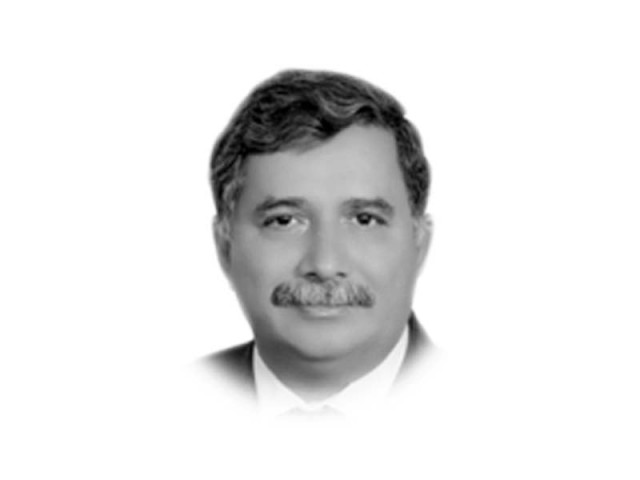Tinkering with fiscal autonomy under 18th amendment
Such overtures must be avoided at all costs

The writer is a former Secretary to Government on Home and Tribal Affairs and IG. He currently heads Good Governance Forum and can be reached at aashah7@yahoo.com
A Chapter of the PTI’s Manifesto focuses on strengthening the federation to empower people at the grossroots level, through local government, and transforming Pakistan by devolving power to the provinces. Before coming to power, all along devolution of power on the pattern of the United States had been the narrative of the party’s chairman. In the same vein, he proposed a system of Sheriffs for the police. Simultaneously, his stance was, “there can be no stability in the country without provincial autonomy and independence of the judiciary” whilst speaking at a seminar organised by Liberal Forum on “Provincial autonomy” in February 2008. Elaborating his point, he said that Balochistan had been neglected in the past, which was creating discord between the Federation and the Baloch people. Never in his five years tenure in Khyber-Pakhtunkhwa government had he opposed the 18th Amendment, rather his stance had all along been demanding the provincial share in the royalties of oil and gas and net hydel profits. He was always loud in criticising the then federal government for not facilitating Khyber Pakhtunkhwa Oil and Gas Company Limited and Pakhtunkhwa Energy Development Organisation (PEDO) in their endeavours to undertake energy projects. The recent diatribe of the PM therefore appears to be in sharp contrast to the philosophy of his party and his earlier speeches.
The PM’s whole case against the 18th Amendment is based on the premise that corruption by the government of Sindh is the reason for the “bankruptcy” of the country. If this is accepted for the sake of argument, the question before us is; what message would have gone to the international community? Wouldn’t the world infer that Pakistan is going bankrupt and thus is not credit-worthy of business. Secondly, if corruption is the sole reason for scrapping the 18th Amendment, then what about the stories of corruption and inefficiency of the federal bodies that the PM himself so fondly told us in the recent past. Weren’t we repeatedly told that billions were embezzled in organisations like the Federal Board of Revenue, WAPDA, Pakistan Steel Mills, Pakistan International Airlines, Workers Welfare Board, Pakistan Railways, Pakistan Works Department, Evacuee Trust Board, Capital Development Authority, import and export regimes and ports? Shouldn’t then the federal government be also stripped of finances on that count? What is sauce for the goose is sauce for the gander.
The Prime Minister’s own dream and his party’s manifesto will not become a reality unless the grievances of the smaller provinces are addressed, and civic services ensured at the grass roots. The ambitious plan of local government with neighbourhood councils has its own financial implications and cannot be implemented without provision of financial resources by the provincial government. The performance of the entities in terms of service delivery can be gauged only on the basis of allocated budget. Will it be possible if the already financially starved provinces are deprived of their resources provided under the 18th Amendment?
Correlated to this are the democratic aspirations and psychological yearning of the people of the smaller provinces who had been aspiring for provincial autonomy for self-governance ever since the birth of Pakistan. The PM, who boasts himself to be a keen observer of history, should be mindful that the central theme of the fractured history of Pakistan has been the question of demarcation of the authority between the centre and the provinces. Throughout history, one set of people at the helm of affairs at the centre equated a strong centre with patriotism and integrity of Pakistan, while the majority in smaller provinces, including East Pakistan, considered autonomy imperative for bringing qualitative change in the lives of the citizens, and in diversity they saw unity. It can be observed that denial of autonomy did not augur well for the unity of the country. Consequently, discontent grew within East Pakistan, Khyber-Pakhtunkhwa, Balochistan and Sindh, giving birth to agitations and ultimately, to insurgency. The persistent resistance to accommodate the feelings of the people resulted in the separation of East Pakistan. The other parts remained in turmoil for want of autonomy. Therefore, autonomy as a slogan and aspirational item had remained top of the list in the manifestos of most of the political parties.
The authors of the Constitution of Pakistan 1973 had agreed upon a federal structure with a commitment that the concurrent list would be abolished leaving only a federal list whereas the residual subjects would go to the provinces. The 18th Amendment is the fulfillment of that commitment and democratic aspirations of the people to uphold the social contract. Any tinkering with this crucial constitutional amendment will result in the dilution of the fiscal autonomy of provinces. Usurping their shares, under whatever name and contention, will prove to be a disastrous expedition. Such overtures must be avoided at all costs.
Published in The Express Tribune, April 17th, 2019.
Like Opinion & Editorial on Facebook, follow @ETOpEd on Twitter to receive all updates on all our daily pieces.















COMMENTS
Comments are moderated and generally will be posted if they are on-topic and not abusive.
For more information, please see our Comments FAQ